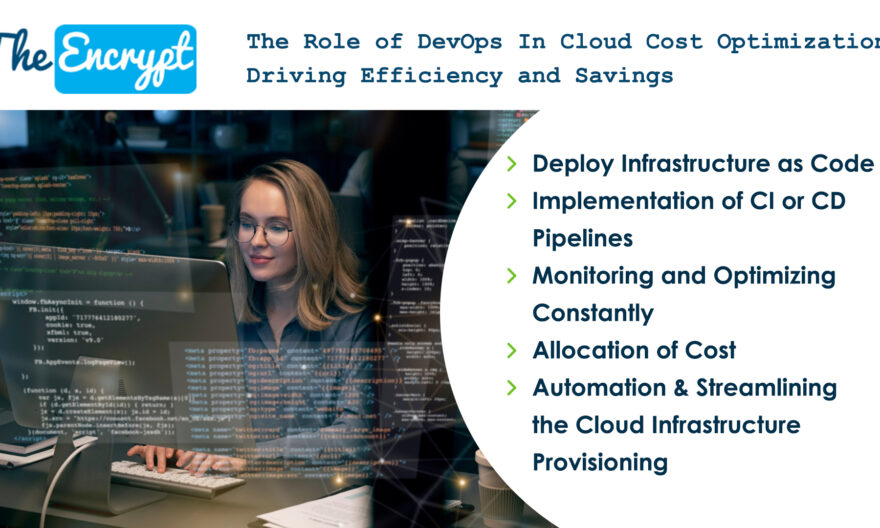
DevOps is exceptionally important as a tool and can reduce your development time by around 41%. While more companies need to deploy such systems, the question is how DevOps can help you optimize the cost.
Everyone knows the dynamic structure of IT. Hence, it does not get better for agility and scalability than DevOps. But, it can become taxing for companies financially as the costs often go high. The need for cost management has become crucial, and DevOps can play a very important role in this regard.
Understanding DevOps And Cloud Cost Optimization
DevOps is one of the best ways to merge the difference between development and operations for the best functioning. The automation of the software and development lifecycle makes DevOps a reliable choice. The core principles of DevOps include automation as well as continuous integration.
Cloud integration is essential as one can optimize costs to maximize resources. Some of the best ways to customize DevOps for maximum cost management are:
Deploy Infrastructure as Code
The most fruitful thing you can do to minimize the cost and optimize is deploying infrastructure as code. This is a key principle for DevOps working and requires one to allow infrastructure to be defined and provisioned through code. But how can this process help you with cost optimization?
When you enable automation of the creation and the destruction of the resources, it will ensure you can reduce the financial risks that ideal resources tend to pose.
When you can take care of the risks and then size them down, it will help you significantly cut down on costs. Additionally, using documented and version-controlled infrastructure will ensure your team can understand the costs associated with the configuration. It will help you to optimize the cost to a great extent!
Implementation of CI or CD Pipelines
While CI refers to continuous integration, CD refers to continuous deployment. The pipelines’ primary work is allowing you to automate the software and delivery process. This will automatically ensure you can get smoother, faster, and more reliable deployments.
You will see an immediate impact on the cost, and it will be optimized to a great extent. The time and resources to deploy the applications on the cloud are much less, which often directly affects the costs. This can be quite a game-changing strategy if you have high requirements for deploying the applications to the cloud.
Monitoring and Optimizing Constantly
DevOps always ensures you can focus on continuous monitoring of applications and the infrastructure. Real-time monitoring of the resources will ensure you can correctly identify the cloud cost waste.
Once you understand cloud cost waste, you can formulate the areas to help you save money. Not only that, it can also help you with cost optimization by establishing alerts as well as automated responses. This can handle instances where the resources are not utilized optimally and unexpected usage surges.
Allocation of Cost
DevOps can allow you to optimize your costs. It can implement effective cost allocation and resource tagging. How does it help you? It ensures that the correct team or project gets the resources.
It ensures you do not waste resources, ultimately leading to increased costs. Moreover, it can also boost accountability and lead to informed decision-making, which will help reduce unnecessary associated costs.
Automation and Streamlining the Cloud Infrastructure Provisioning
Another prominent way that DevOps can allow you to optimize costs is with the help of automation and streamlining of the cloud infrastructure provisioning. Automating and streamlining will ensure you can use tools that can aid you with automatically allocating and deallocating cloud resources. This can significantly reduce manual resource usage, which is essential.
This automation can help you enhance the speed of the resource deployment and relieve the risk of overprovisioning. It can ensure that you can allocate resources based on your needs and prevent unnecessary costs.
Case Studies: DevOps and Cloud Cost Optimization Success Stories
Background
Company A is a mid-sized technology firm that has been unable to optimize its costs. Recognizing the need for the same, they have implemented DevOps, which has optimized the cloud infrastructure and brought down the costs.
Implementation
Company A brought forth various strategies that adopt cost optimization. The first thing they did was automate the cloud infrastructure using the DevOps tools. They did it by implementing scripts and configuration management tools to automate resource deployment and scaling. Moreover, they also included CI/CD pipelines. It accelerated the software deployment and deployment processes. It reduces the time to market for application but can also contribute to efficient resource utilization in the cloud environment.
Results
After deploying these strategies, the company could reduce cloud spending by more than 30%. Not only that, but the company was able to note that there was a marked improvement in resource utilization. This resulted from automation and continuous monitoring, which allowed one to work according to the needs of the resources.
Conclusion
DevOps is one of the most collaborative tools. You will see remarkable changes by using it correctly and implementing the strategies. DevOps practices can help you achieve optimal levels of resource utilization, allowing you to get maximum cost optimization. Hence, it is a strategic option known to enhance the efficiency of the operations. At the same time, you can see how much cloud costs can be minimized. All you need to do is deploy and maintain these strategies for maximum efficiency.
